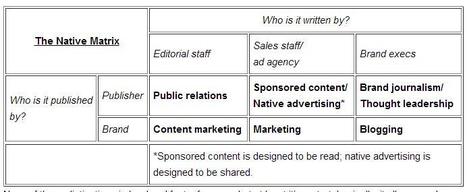In preparation for one of CMI’s upcoming reports, I’ve had the pleasure of meeting with a number of companies that are in what’s being called the “native advertising” space. Through this experience, I’ve come to the conclusion that, while the technique can potentially create significant value, native advertising is actually neither “native” nor “advertising.” It is simply one aspect of the larger discipline we know of as branded content marketing.
Native by any other name
According to Wikipedia (which I chose not because of, you know, Wikipedia, but because it seemed to be the only place offering one up), native advertising is defined as:
“…a method in which the advertiser attempts to gain attention by providing valuable content in the context of the user’s experience. Native ad formats match both the form and the function of the user experience in which it is placed.”
In short, native advertising takes content and places it in the context of a publisher’s site. So, whether you think of it as an advertorial, a paid guest post, a sponsored tweet, or just a really extensive ad, it’s basically paying for your engaging branded content to have a prominent and contextual place on somebody else’s platform.



 Your new post is loading...
Your new post is loading...















Robert Rose wrestles with the term "native advertising" and suggests it is neither "native" nor "advertising." I agree and his argument is sound.